The 2024 Job Seeker Survey Report
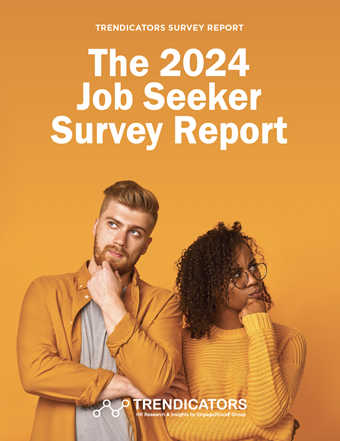
Introduction
Welcome to the 2024 Job Seeker Survey Report, an analysis of the perceptions and preferences of active and passive candidates across all major industries in the U.S. produced by Trendicators, the research division of the Engage2Excel Group. Now in its fifth edition, this report is based on survey responses from 1,500 job seekers surveyed in February 2024.
The fundamental aspects of what people want when seeking employment have remained relatively constant since our first Job Seeker Survey Report in 2019. Despite significant changes in society, the workplace and the economy, candidates want to be recognized and respected during hiring and onboarding processes, seek fair and equitable compensation, and look for a combination of job fit, positive working conditions and job security when evaluating job offers and deciding whether to seek employment elsewhere.
This report presents important insights into six key questions. The answers to these questions should influence your organization’s talent acquisition and retention strategies to optimize success.

Download
 hbspt.cta.load(123973, '9b552a39-a7dc-4526-af3e-c0589d9f3a16', {"useNewLoader":"true","region":"na1"});
hbspt.cta.load(123973, '9b552a39-a7dc-4526-af3e-c0589d9f3a16', {"useNewLoader":"true","region":"na1"});
Where does remote work currently stand?
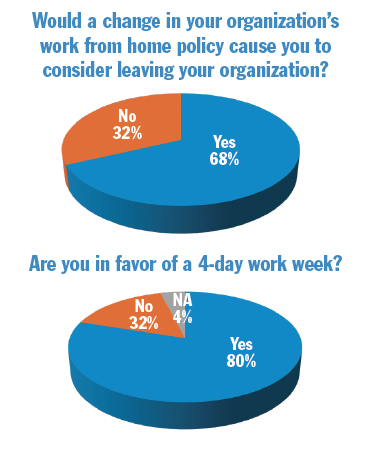 Time Spent Working Remotely: Most 2024 survey respondents (55%) reported working remotely at least 20% of the time. The percentage who reported working remotely from 60% to 100% of the time was 16%, virtually unchanged from last year’s results.
Time Spent Working Remotely: Most 2024 survey respondents (55%) reported working remotely at least 20% of the time. The percentage who reported working remotely from 60% to 100% of the time was 16%, virtually unchanged from last year’s results.
Return to Office Timing: A large percentage (58%) expected to return to the office within the next three to six months, but 11% were still uncertain of when they would return. The percentage of those who did not plan on returning to the office dropped to 12%, eight percentage points from 2023 results.
Policy Perceptions: More than two-thirds (68%) reported that a change in their organization’s work from home policy would cause them to consider leaving, and an overwhelming 80% of respondents favored a four-day work week.
Remote Work Challenges: The most difficult challenges cited in working from home included managing work/life balance (61%), overcoming at-home distractions (36%) and managing mental health issues (28%).
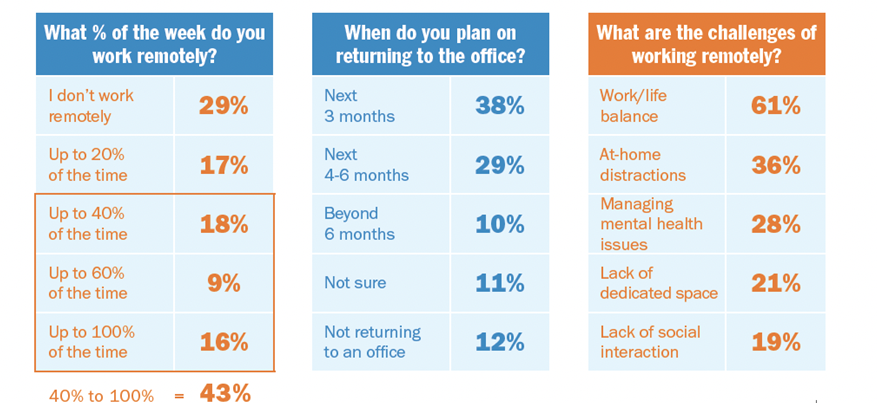
Download
 hbspt.cta.load(123973, '9b552a39-a7dc-4526-af3e-c0589d9f3a16', {"useNewLoader":"true","region":"na1"});
hbspt.cta.load(123973, '9b552a39-a7dc-4526-af3e-c0589d9f3a16', {"useNewLoader":"true","region":"na1"});
How many respondents worked more than one job to keep up?
We asked survey respondents if they worked a side gig in 2023 when the annual inflation rate was 3.4%. At the end of February, the inflation rate is virtually unchanged, but we are still reeling from last years inflation that topped 9%.
A significant number of respondents (44%) reported working more than one job to make ends meet. A vast majority (81%) reported that their full-time employers knew of their extra jobs, and nearly half (44%) were devoting 10 to 20 hours a week to their side gigs. This year, the percentage of respondents who reported devoting 31 or more hours to their side gig was 12%, up 3 percentage points over 2023.
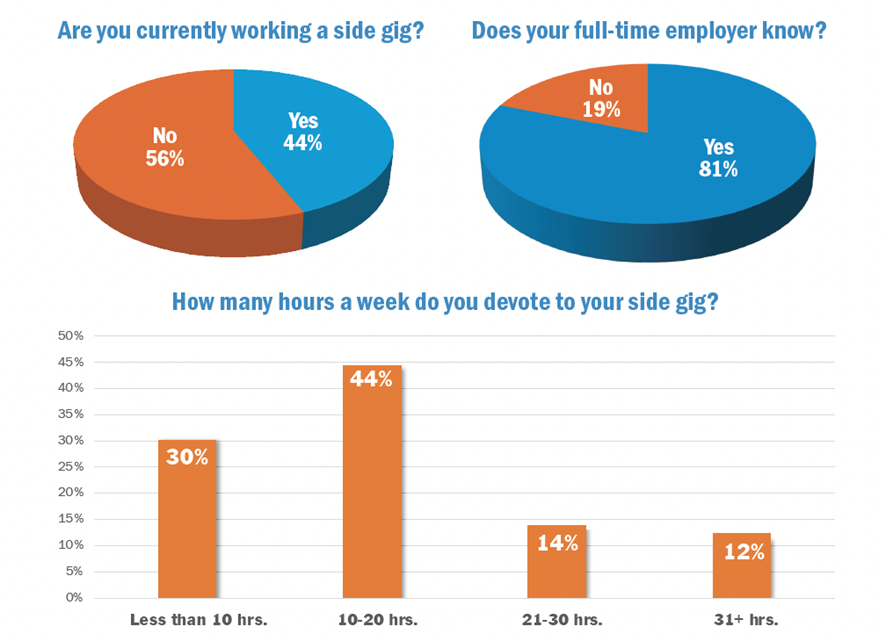
Download
 hbspt.cta.load(123973, '9b552a39-a7dc-4526-af3e-c0589d9f3a16', {"useNewLoader":"true","region":"na1"});
hbspt.cta.load(123973, '9b552a39-a7dc-4526-af3e-c0589d9f3a16', {"useNewLoader":"true","region":"na1"});
Why do people seek employment elsewhere?
It is not at all surprising that fair compensation has been cited by survey respondents as the top reason for seeking employment elsewhere in all but one of our surveys since 2019. In 2022, amid a robust hiring streak and annual inflation at 6.5%, lack of recognition edged out compensation by one percentage point as the most important attrition driver. What is more interesting in reviewing perceptions over the years is just how important recognition is as a retention driver.
In 2024, 15% of survey respondents said that lack of recognition was the second most important reason that would cause them to leave their employer, a drop of three percentage points from 2023. With wages failing to keep pace with inflation and many families struggling to make ends meet, the reduced importance of recognition and job security gave way to other concerns. These included a lack of training as well as high stress associated with inflexible hours or poor interpersonal relations with co-workers.
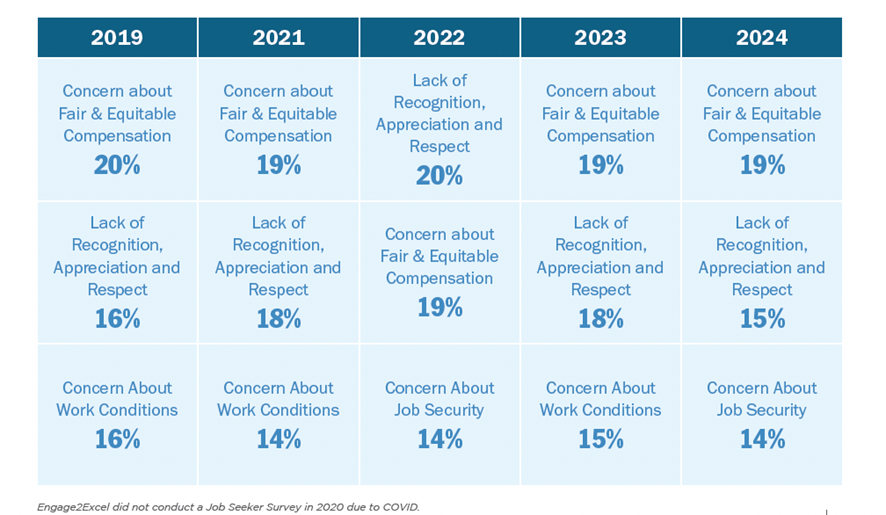
Download
 hbspt.cta.load(123973, '9b552a39-a7dc-4526-af3e-c0589d9f3a16', {"useNewLoader":"true","region":"na1"});
hbspt.cta.load(123973, '9b552a39-a7dc-4526-af3e-c0589d9f3a16', {"useNewLoader":"true","region":"na1"});
Why do candidates accept or reject job offers?
Much has changed since our first Job Seeker Survey Report in 2019. Despite the pandemic, remote work, inflation and changing demographics, what candidates seek when deciding whether to accept a job offer has remained remarkably constant over the past five years. The table below shows candidates top three factors with the most significant influence on their decision to accept or reject a job offer. Whether or not a candidate is shown recognition, appreciation and respect throughout the entire hiring process was found to be most important, followed by fair compensation and job fit. In 2024, the importance of recognition on offer acceptance dropped to 26% from 31%, reflecting greater concern over job security and other factors.

Download
 hbspt.cta.load(123973, '9b552a39-a7dc-4526-af3e-c0589d9f3a16', {"useNewLoader":"true","region":"na1"});
hbspt.cta.load(123973, '9b552a39-a7dc-4526-af3e-c0589d9f3a16', {"useNewLoader":"true","region":"na1"});
How do onboarding experiences affect the intent to stay?
Another workplace reality that has remained consistently important over the past several years is that onboarding experiences have a profound influence on attrition rates. Candidates believe that how they are treated during the hiring process reflects the quality of the relationship they will have with an employer. If experiences during the onboarding process don’t align with expectations set early on in recruiting and interviewing processes, employees are far more likely to leave.
The Impact of Onboarding Experiences: Nearly two-thirds (65%) of 2024 survey respondents said that the first day of their onboarding experience is highly likely or likely to affect their decision to stay for more than a month. Furthermore, 63% said that their onboarding experience would influence their decision to stay for more than a year. In our 2023 publication Improving Retention Rates for New Hires, we reported that the cost of early attrition could range from 16% to 213% of an employee’s annual salary. Poor onboarding experiences, inadequate training and lack of attention to and mentorship for new hires were among the top causes of early attrition. Creating meaningful onboarding experiences is critical for maximizing your organization’s talent advantage in today’s highly competitive environment.
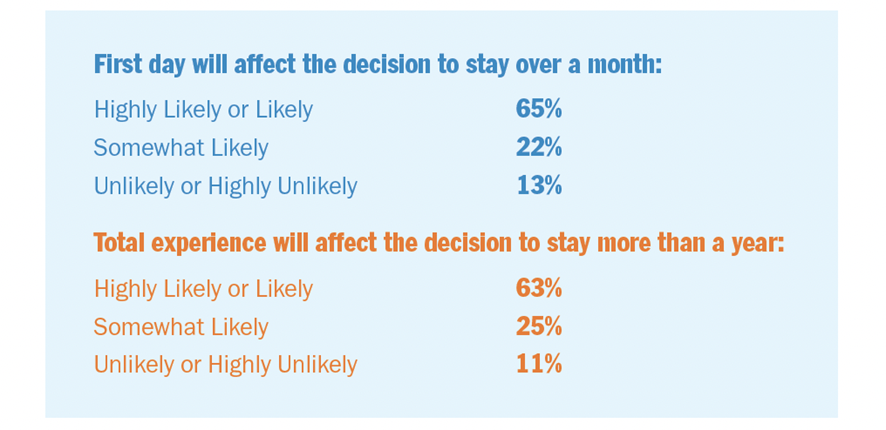
Download
 hbspt.cta.load(123973, '9b552a39-a7dc-4526-af3e-c0589d9f3a16', {"useNewLoader":"true","region":"na1"});
hbspt.cta.load(123973, '9b552a39-a7dc-4526-af3e-c0589d9f3a16', {"useNewLoader":"true","region":"na1"});
What do candidates think about the recruitment process?

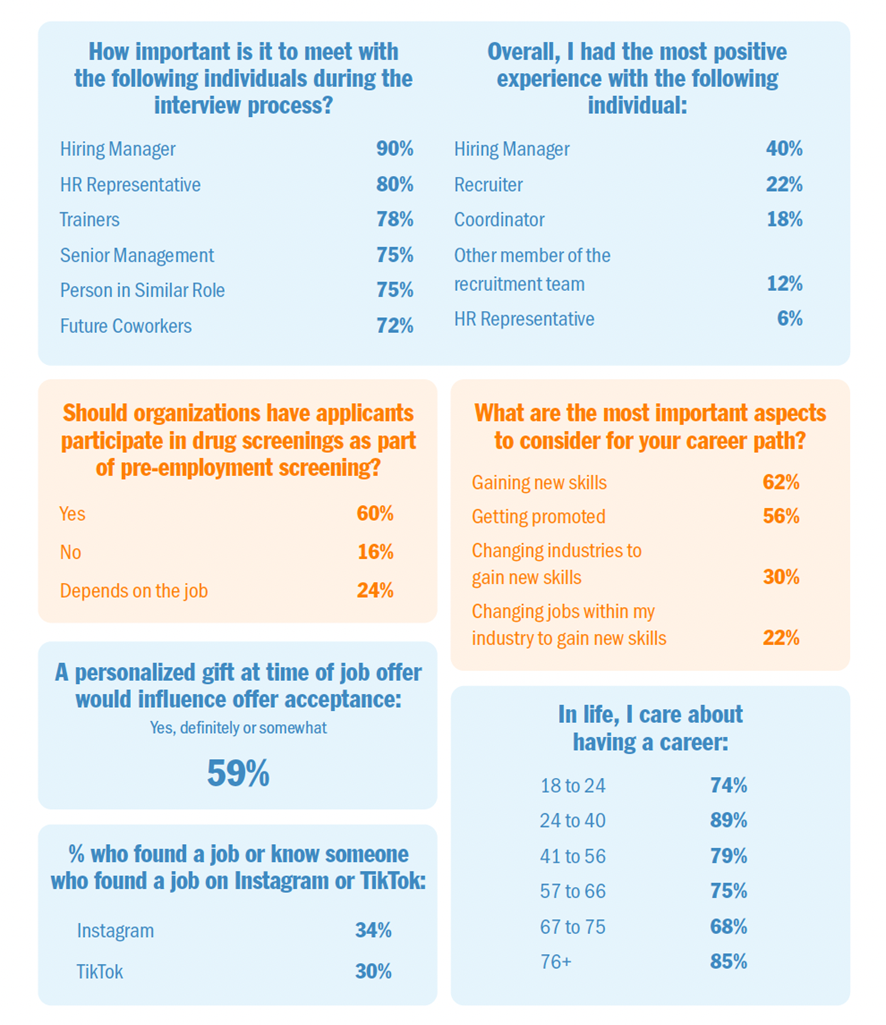
Download
 hbspt.cta.load(123973, '9b552a39-a7dc-4526-af3e-c0589d9f3a16', {"useNewLoader":"true","region":"na1"});
hbspt.cta.load(123973, '9b552a39-a7dc-4526-af3e-c0589d9f3a16', {"useNewLoader":"true","region":"na1"});
Key Takeaways From The 2024 Job Seeker Survey Report
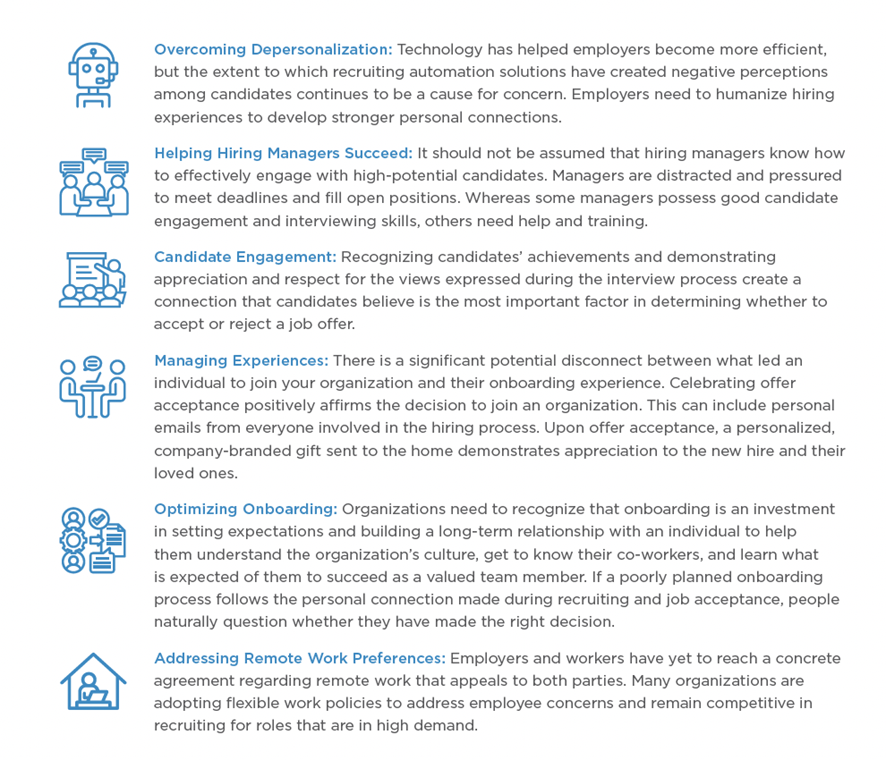
Download
 hbspt.cta.load(123973, '9b552a39-a7dc-4526-af3e-c0589d9f3a16', {"useNewLoader":"true","region":"na1"});
hbspt.cta.load(123973, '9b552a39-a7dc-4526-af3e-c0589d9f3a16', {"useNewLoader":"true","region":"na1"});